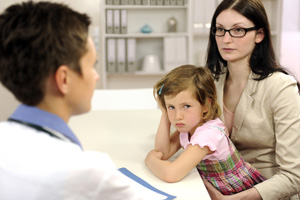MEDICAL training about intimate partner violence needs improvement and consistency, says a leading Australian GP educator.
Professor Danielle Mazza, head of the department of general practice at Monash University in Melbourne, said GPs needed extensive training in intimate partner violence (IPV) because of its high degree of association with physical and mental health outcomes, and a “whole string of morbidities”.
Professor Mazza was responding to an Australian study published in The Lancet, which found that screening and counselling in the primary care setting for women who experienced IPV made no significant difference to the women’s quality of life, safety planning and behaviour, or mental health. (1)
She told MJA InSight the negative results from the trial were “not a reason for general practitioners to ignore the issue of IPV”.
The randomised control trial involved 52 GPs from clinics in Victoria and 272 female patients (aged 16–50 years) who screened positive for fear of a partner in the previous 12 months in a postal health and lifestyle survey.
The authors randomly allocated 25 doctors and 137 women to the intervention group, and 27 doctors and 135 women to the control group. The intervention consisted of training for the doctors, notifying the doctors of women screening positive for fear of a partner, and inviting women to up to six sessions of counselling for relationship and emotional issues.
“We detected no difference in quality of life, safety planning and behaviour, or mental health [using the SF-12 questionnaire] at 12 months”, the authors wrote.
However, the study did find that “depressiveness caseness” (according to the Hospital Anxiety and Depression Scale) at 12 months improved in the intervention group compared with the control group. Doctor enquiry about women’s and children’s safety also improved at 6 months, the researchers wrote.
Professor Mazza said although most medical curricula around the country had some element of training in IPV at undergraduate level, it was a “very small element”.
“The degree of training is variable and is often reliant on interested individuals at the local level to ensure it gets included. It’s not mainstream.”
Professor Mazza called for better standards and frameworks within the medical curricula.
“First of all, doctors need to understand what intimate partner violence is and the psychosocial effects it can have. They also need to understand the morbidities associated with IPV and how it presents”, she said.
“Women don’t just walk into the surgery and say ‘I’m the victim of domestic violence’. Instead they present with irritable bowel syndrome or depression or anxiety or headaches or fatigue, or any one of a number of other problems.”
Professor Mazza said teaching needed to involve an understanding of the role of the GP and what the GP could do. “Many [GPs] get frustrated because they think that just talking about IPV with their patient will change their behaviour.
“This study demonstrates exactly how difficult it is to get things to change”, she said.
Dr Libby Hindmarsh, co-chair of the Royal Australian College of General Practitioners’ Abuse and Violence Specific Interest Group, said the improvement in depression symptoms in patients in the study was “amazing”.
“If you look at Australian women aged between 15 and 45 years, the most likely cause of death or disability is family violence”, Dr Hindmarsh said.
“This is a problem that impacts the whole community. What we want is for the GPs to do their bit well. Be aware of the issue, ask the patients about it, believe what they tell you and, when they are ready, refer them to the appropriate help.”
Study coauthor, Dr Kelsey Hegarty of the General Practice and Primary Health Care Academic Centre at the University of Melbourne, said although the trial had produced a generally negative result, the positive change in depressive symptoms was a strong positive message.
“We interpreted the 17% between-group difference in reports of depressive symptoms as clinically relevant”, she told MJA InSight.
“That is a very similar result to those found in antidepressant trials.”
– Cate Swannell
1. Lancet 2013; Online 16 April
Posted 22 April 2013

 more_vert
more_vert
I am disturbed by the use of the acronym IPV in this piece. The acronym removes all the psychological undertones that belong with the term “domestic violence”. I think that it degrades what has happened to these women and men. If it’s violence, say so, and don’t hide from the truth.
“What we want is for GPs to do their bit well.”
Perhaps the PBS could do the PBS bit well, and make anti-depressant medication a restricted benefit for patients with a GPMHCP being treated by a Psychologist.
As a GP, I frequently see women requesting a repeat prescription for an anti-depressant medication, initiated by a Psychiatrist years ago, often following domestic violence.
I saw such a patient today for the first time, and offered referral to a clinical Psychologist. The patient refused, said she had done all that 4 years ago, did not need that…
There is limited evidence for the efficacy of ongoing anti-depressant medication , so I suggest that a PBS restriction may help “GPs to do their bit well.”
While GPs , like EDs, may be the frontline for domestic violence, the study has not differentiated between training GPS,notifying GPS, and the effectiveness of 6 sessions of counselling.I suspect the latter is the reason for the improvement in depression and safety .
The insidious effect of this situation is clear to those of us involved in psychotherapy. The predisposing factors usually involve attachment and development issues.
The problem is even more complicated when the patient is a single mother and the perpetrator is a late-teenage/young adult son who refuses to move out, and the mother has no support network.